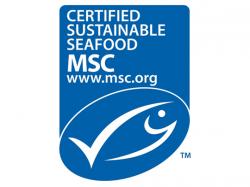Marine Stewardship Council Names Marin Hawk As Fisheries Manager
March 11, 2015 | 3 min to read

Seattle, WA – The Marine Stewardship Council (MSC) is pleased to announce Marin Hawk has been named the organization’s Fisheries Manager for U.S. Atlantic and Gulf of Mexico fisheries and will be the primary outreach representative for fisheries in these areas. Previously with the Atlantic States Marine Fisheries Commission (ASMFC), Hawk is based in MSC’s recently opened Washington, D.C. office.
At ASMFC, Hawk was a Fishery Management Plan Coordinator where she was responsible for the development and coordination of fishery management plans for six of the Commission’s species and was the primary point of contact for industry members, scientists and other stakeholders. She has also worked with the South Carolina Department of Natural Resources as a Fisheries Data Coordinator.
Geoff Bolan, MSC’s U.S. Program Director, said: “We’re delighted to welcome Marin and to have her based on the East Coast to be even more accessible for U.S. Atlantic and Gulf of Mexico fisheries. Marin is well-known in the industry from her time with the ASMFC and brings to the MSC extensive knowledge and experience working with fisheries and promoting responsible and effective management.”
Focus on fishery clients and other stakeholders
As MSC Fisheries Manager, Hawk is responsible for outreach to fisheries within the U.S. Atlantic and Gulf of Mexico, which includes education about the MSC program, assessment process, and certification requirements.
Marin Hawk, MSC’s Fisheries Manager for the U.S. Atlantic and Gulf of Mexico, said: “I look forward to working with Atlantic and Gulf of Mexico fisheries and their respective processors, management agencies, government representatives and NGO partners to build understanding of the MSC program. I have always had an interest in sustainable seafood and I am excited about this opportunity to make a positive and enduring impact on our oceans and fisheries.”
Growth in the MSC program
Around half (53%) of fisheries in the USA and two-thirds (62%) of Canadian fisheries are engaged with the MSC program. Together these fisheries account for approximately 3.2 million metric tons of seafood caught every year. With the growth of the program in the Americas, MSC is moving toward having representatives available to fishery and commercial partners within more specific geographic areas. Jay Lugar, the previous fisheries outreach representative for much of the area now managed by Hawk, was promoted to Program Director Canada last year and is building out a team in Canada to also better serve partners there.
About the Marine Stewardship Council (MSC)
The Marine Stewardship Council (MSC) is an international non-profit organization set up to help transform the seafood market to a sustainable basis. The MSC runs the only certification and ecolabeling program for wild-capture fisheries consistent with the ISEAL Code of Good Practice for Setting Social and Environmental Standards and the United Nations Food and Agricultural Organization Guidelines for the Ecolabeling of Fish and Fishery Products from Marine Capture Fisheries. These guidelines are based upon the FAO Code of Conduct for Responsible Fishing and require that credible fishery certification and ecolabeling schemes include:
- Objective, third-party fishery assessment utilizing scientific evidence;
- Transparent processes with built-in stakeholder consultation and objection procedures;
- Standards based on the sustainability of target species, ecosystems and management practices.
The MSC has regional or area offices in London, Washington D.C., Tokyo, Sydney, The Hague, Beijing, Berlin, Cape Town, Copenhagen, Halifax, Paris, Madrid, Stockholm, Santiago, Moscow, Salvador, Seattle, Singapore and Reykjavik.
In total, over 350 fisheries are engaged in the MSC program with 252 certified and 99 under full assessment. Together, fisheries already certified or in full assessment record annual catches of around ten million metric tons of seafood. This represents over ten per cent of the annual global harvest of wild capture fisheries. Certified fisheries currently land over eight million metric tons of seafood annually – around nine per cent of the total harvest from wild capture fisheries. Worldwide, more than 26,000 seafood products, which can be traced back to the certified sustainable fisheries, bear the blue MSC ecolabel.
For more information on the work of the MSC, please visit www.msc.org
Source: Marine Stewardship Council (MSC)
